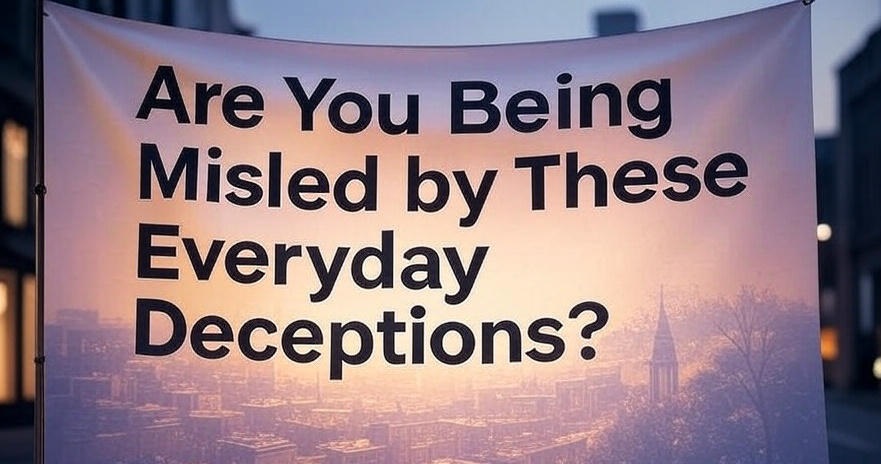We like to think we make informed decisions, that we're in control of our choices. But the truth is, our modern lives are riddled with subtle psychological traps and widespread myths that quietly guide our behaviors. From the way we shop to how we interact on social media, there are countless ways we are being subtly manipulated—often without even noticing. Here are some of the most common yet shocking ways you might be getting misled in everyday life.
1. The Illusion of Choice
Think you're picking what you want at the grocery store or online? Many of your choices are predetermined by marketing tactics like product placement, color psychology, and strategic pricing. That “sale” may have just been marked up before being discounted to seem like a deal.

2. The Anchoring Effect
Ever seen a $1,000 luxury item next to a $100 item and felt like the $100 one was a bargain? That’s anchoring. Your brain uses the first number it sees as a point of reference, skewing your sense of value—even if both prices are unreasonable.
3. The Myth of Multitasking
Many people believe multitasking is a sign of productivity. In truth, the brain can’t perform two cognitively demanding tasks at once. You’re just switching rapidly and doing both things less effectively. It reduces efficiency and increases stress.
4. “Healthy” Labels That Aren’t
Just because something is labeled “organic,” “low-fat,” or “natural” doesn’t mean it's good for you. These terms are often marketing-driven and don’t always reflect true nutritional value. Sugar-filled granola? Still bad, even if it's organic.
5. Social Media Highlight Reels
We compare ourselves to others on social media, often forgetting that what we're seeing is a curated highlight reel. People post their best moments, not their struggles. Believing that others live perfect lives can affect your self-esteem and mental health.
6. News That’s Not News
Not everything you read is journalism. Much of what appears as news is sponsored content, PR, or repackaged press releases. Critical thinking is crucial—learn to check sources, biases, and motivation behind the headlines.
7. Loyalty Programs Aren’t Always for You
Rewards programs seem to benefit customers, but they often exist to collect your data and encourage repeat purchases you may not need. They manipulate spending habits under the guise of exclusive perks.
8. Time-Saving Tech That Costs Your Time
Smartphones and digital assistants promise to save time, but studies show we spend more time managing notifications, switching apps, and getting distracted. Sometimes, analog is faster and healthier.
9. The Sunk Cost Fallacy
Staying in a bad job, relationship, or subscription because you’ve already invested time or money? That’s the sunk cost fallacy. Letting go can be smarter than doubling down on a bad choice.
10. Advertising That Hijacks Emotions
Modern ads aren’t just about selling products. They tell stories that evoke emotion—love, fear, pride—to bypass logic and create brand loyalty. You’re buying feelings, not things.
11. “Limited-Time Offer” Pressure
“Only 2 left in stock!” and countdown timers are designed to create urgency. In reality, supply is rarely limited. These psychological nudges push you to act fast without thinking clearly.
12. Beauty Standards in Media
From airbrushed models to filters and editing, the beauty we see in magazines and Instagram isn’t real. These false standards shape body image, especially in young people, creating unattainable expectations.
13. Productivity Myths
Waking up at 5 a.m., grinding without breaks, and sleeping less are glorified. But burnout is real. Productivity isn’t about working more—it’s about working smarter. Rest is a productivity tool, not a weakness.
14. Misleading Food Packaging
Packaging can say “whole grain” or “fruit flavored” but contain minimal real nutrients. Always read the ingredient list and nutrition facts rather than trusting the front of the box.
15. You Don’t Really Own Digital Content
Buy a movie or ebook online? In many cases, you’re licensing it—not owning it. Platforms can revoke access or change terms anytime. Physical media still has advantages.
16. Subscription Creep
Netflix, Spotify, Amazon, cloud storage... they add up. Most people forget they’re subscribed to multiple services and rarely track renewals. Regular audits can save you money.
17. Corporate Greenwashing
Brands claim eco-friendliness but often exaggerate. “Carbon neutral” might mean buying offsets rather than reducing emissions. Look for transparency, not trendy buzzwords.
18. Free Services Aren’t Free
When you use free apps or platforms, you’re the product. Your data is being monetized to target you with ads or sold to third parties. Always ask: what’s in it for them?
19. Fake Reviews and Ratings
Many online reviews are fake or incentivized. Sellers use bots or pay-for-reviews services. If a product looks too good to be true, dig deeper. Look for verified purchases and mixed reviews.
20. Default Settings That Don’t Serve You
Apps, browsers, and devices come with default settings that prioritize company interests—not yours. From data tracking to notifications, changing these defaults can improve your privacy and experience.
Conclusion: Wake Up and Reclaim Control
The more you become aware of these daily deceptions, the more power you have to make truly informed choices. Modern life may be filled with convenience and innovation, but it's also filled with psychological traps. Stay curious, question often, and make awareness your superpower.






